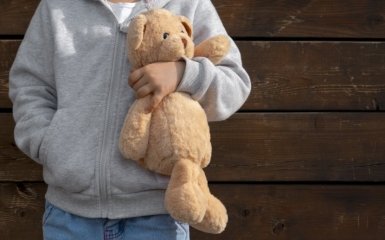The Russian government has developed a whole system of "re-education" of children kidnapped from Ukraine, tries to form a "Russian identity" in them, convinces that their parents are dead and considers them "potential terrorists".
How Russia makes Ukrainian children Russian
The investigation by Meduza reports that the exact number of Ukrainian children forcibly taken to Russia during the war is unknown — according to Kyiv, it is about 20,000. Russian officials persuade Ukrainians to forget about their homeland — and convince them that their parents will never come to take them home. The authorities are confident that they will be able to "re-educate" the stolen children.
According to the publication, the Ministry of Education of the Russian Federation is the primary agency responsible for the "indoctrination" of deported Ukrainian children.
The dictionary developed in 2022 for teachers of the Russian Federation included words and expressions defined as those that "contain signs of extremism on a nationalist basis" and can be used by deported Ukrainian children. In particular, "Glory to Ukraine! Glory to the heroes!", "Racism", etc.
Also, in the manual "Prevention of conflicts, manifestations of extremism and terrorism in a multicultural educational environment" it is said that the appearance of "specific slang" in the speech or even just the discussion of "political topics" can be a sign that "destructive ideology" is widespread among children.
The Ministry of Education notes that the kidnapped children were allegedly "influenced" by this ideology simply because they lived in Ukraine. It is not specified what the "influence" was.
The documents studied by the publication state that Russian teachers are faced with "reorienting and forming the Russian identity of the younger generation of the Donetsk and Luhansk People's Republics, Zaporizhzhia and Kherson regions."
The Russians use propaganda techniques.
In addition, the developers of the manual "Accompaniment of teenagers who have arrived from war zones" warn that abducted children may show "protest", "fickleness", "distrust of adults", behave aggressively, express "ideas of personal superiority" — as well as in general, "to experience difficulties in looking at emerging situations through the eyes of a neutral observer."
Russian teachers are also advised to say directly that the parents of deported children have died, even if there is no concrete data about this.
Don't say, "It's okay", "don't worry, they're in a better place", or "they're on a cloud watching you"... Talk honestly with the child about the fact that their loved ones died or their home was destroyed... Directly say that they died, says the manual.
At the same time, the war, the only reason why the children ended up in Russia, is described by the methodology of the Ministry of Education of the Russian Federation as follows: "complication of the geopolitical situation, which... pushes families... to forced resettlement."
In addition, communication with Ukrainian children is conducted only in Russian.
All those who make decisions say without any shame that the work (with Ukrainian children, — ed.) should be conducted in Russian — everyone there knows it; and if they don't have it well, let them master it, says a source in the department. "For example, the Constitution says that the Russian language is the state language: if you come to Russia, speak Russian," the publication's source points out.
Children kidnapped from Ukraine are afraid of the Ministry of Education. Among themselves, employees of the Russian department, even at the management level, sometimes call these teenagers "potential terrorists" who "may begin to oppose" the Russian authorities, the publication says.
Commissioner for Children's Rights under the President of Russia Maria Lvova-Belova, whose arrest warrant was issued by the International Criminal Court, insists that Russians cannot adopt a child from "new regions". "Only guardianship or a foster family" (so that the child can be returned to the family), she assures. But this, as Meduza points out, is not true.
The publication notes that the Federal Youth Center works within the structure of the Ministry of Education, which coordinates ideological work with teenagers outside of schools. Only the costs of the centre's staff travel amount to millions of rubles: "integration intensives" for teenagers are spent on this money.
The Center for the Study and Network Monitoring of the Youth Environment — an IT company founded on Putin's instructions and receiving billions of rubles from the budget — monitors Ukrainian children on the Internet. Its developments presumably make it possible to "deanonymize" any child's page and analyze it down to the likes — as a result, the child is assigned a "coefficient of destructiveness" and "coefficient of opposition."
Why is it essential to watch the movie "Abducted Childhood"
In 2023, the Online.UA team presented the documentary project "Abducted Childhood", which collected the stories of Ukrainian children abducted to Russia.
The heroes of the documentary talk frankly about how and where they met the war, what crimes the Russians faced and how they tried to save their lives and the lives of their loved ones.
Every day, the Ukrainian side does everything possible to return abducted minors, but diplomacy with Russia does not work, so the process is complicated and slow.
Russia continues to illegally remove children from the temporarily occupied territories of Ukraine. However, this is not an evacuation, as the Russians claim, but a mass abduction of minor citizens of Ukraine.
In its new film, the Online.UA team documented children's testimonies about the war crimes committed by the Russian Federation against the Ukrainian people.




